#desire and identity
Explore tagged Tumblr posts
Text
Pink Is Not Weak: How One Color Is Leading a Quiet Revolution
Once dismissed as frivolous, girlish, or "too soft," the color pink is undergoing a quiet but powerful renaissance. In recent years, it has crept back into fashion, interior design, branding, and—most notably—onto the bodies of those who were once told to stay far away from it: boys, men, and those assigned male at birth.
But this shift is not just aesthetic. It's cultural. It's psychological. And, in many ways, it's revolutionary.
The Strange History of Pink
It might surprise you to learn that pink was once considered a strong, even masculine, color. In Renaissance portraiture, nobles and knights often wore rich pink silks embroidered with gold, a display of status and vitality rather than softness. In Japan, pink has long been linked to cherry blossoms — symbols of fleeting beauty, yes, but also the honor of samurai who saw life’s fragility as a reason for courage. In the 18th and 19th centuries, young boys were often dressed in pink—seen as a softer derivative of red, the color of battle, blood, and vigor. Blue, by contrast, was thought to be calm and pure, making it more appropriate for girls.
It wasn’t until the early 20th century—driven by shifting marketing strategies and post-war gender anxieties—that this association flipped. Suddenly, blue became “boyish” and pink was branded as a symbol of feminine delicacy. From that moment, pink was not just a color—it was a code. To wear it was to signal softness, vulnerability, or worse: femininity. And for generations, men were taught to fear it. School dress codes, marketing campaigns, even toy aisles reinforced this fear by drawing stark lines between ‘boy colors’ and ‘girl colors.’ Pink became taboo for boys at exactly the age when they were first told to hide tears, toughen skin, and armor their hearts.
The New Pink Renaissance
Fast forward to today, and pink is back—but this time, it's coming with purpose.
Across fashion runways, music videos, protest marches, and city streets, pink is shedding its shame. It appears in oversized hoodies, nail polish, tactical vests, sneakers, and hair dye. When artists like Lil Nas X, Bad Bunny, or Timothée Chalamet don pastel tones with boldness, they’re not just making a style choice—they’re making a statement.
To wear pink today, especially as someone who has been conditioned to avoid it, is to reclaim softness. It’s also an invitation to others: a signal that the old codes can be rewritten in plain sight, not by force, but by color. A pink tie in a boardroom, a pink hoodie on a rapper’s back, a pink streak in a teen’s hair — each is a small, quiet defiance of an inherited rule. It's to reject the long-standing equation between masculinity and emotional suppression. It's to say: gentleness is not weakness. Intimacy is not shameful. A color doesn’t have a gender, but we gave it one—and now we’re taking that back.
Color, Mood, and the Mind
Psychologists have long known that color affects emotion. Pink, in particular, has been shown to have calming effects. A famous example is the so-called drunk tank pink, used experimentally in prison cells and sports locker rooms to pacify aggression — so effective that opposing teams once protested its psychological advantage. In fact, certain correctional facilities have used “Baker-Miller Pink” in holding cells to reduce aggression and heart rate. Whether or not this practice is ethically sound, it underscores something intuitive: pink invites a different emotional register.
In everyday life, surrounding yourself with softer hues—rose, blush, salmon, mauve—can open new pathways of self-expression and mental clarity. It's not just about looking different. It's about feeling different. About letting yourself exist outside the armor of monochrome and monotony.
Pink as Political
Every generation has found new ways to weaponize softness. In the 1980s, ACT UP activists flipped the pink triangle into a global symbol of queer rage and refusal. Today, trans rights flags and gender-fluid fashion houses keep pushing pink into new frontlines of cultural battles.
Let’s not forget: pink has always had an edge. From the triangle used by queer prisoners in Nazi Germany (later reclaimed by LGBTQ+ activists), to the iconic Pussyhat protests, to contemporary drag and trans aesthetics, pink has carried the weight of defiance. It is softness used as a blade. It is vulnerability as power. It is coded rebellion in a world still obsessed with control.
And now, as more people question rigid gender binaries, as climate concerns demand a reevaluation of our relationship with domination and force, and as younger generations search for more authentic ways of living—the return of pink signals something deeper. A cultural pivot. A realignment of values.
Pink is no longer the color of passivity. It’s the color of transformation. It’s proof that what we code as ‘weak’ can outlast what we worship as strong. Empires crumble — colors remain. Pink survived ridicule, backlash, shame — and bloomed again.
So... Why Not Pink?
Try it. Wear it. Paint with it. Sit in a pink-lit room. Let it seep into your palette, your wardrobe, your language. Not because it’s “trendy,” but because it might bring you closer to parts of yourself you’ve been taught to ignore.
Pink doesn’t make you less. It makes you more.
It’s not a retreat. It’s an evolution.
A reminder that strength isn’t always loud or angular—it can be soft, fluid, open. That beauty isn’t always cold or hard—it can be warm, generous, healing.
Pink is not weak. Pink is the revolution we forgot we needed.
To wear pink is to remember: we don’t break when we bend — we bloom.

#genderfluid#philosophy#androfemineism#female#male beauty#femininity#feminism#gender and power#gender studies#psychology#gender ideology#desire and identity#gender identity#identity#transfeminism#transfem#transgender#androgynous#sexuality#gender fluid#lifestyle#depth psychology#pink#pink color
10 notes
·
View notes
Text
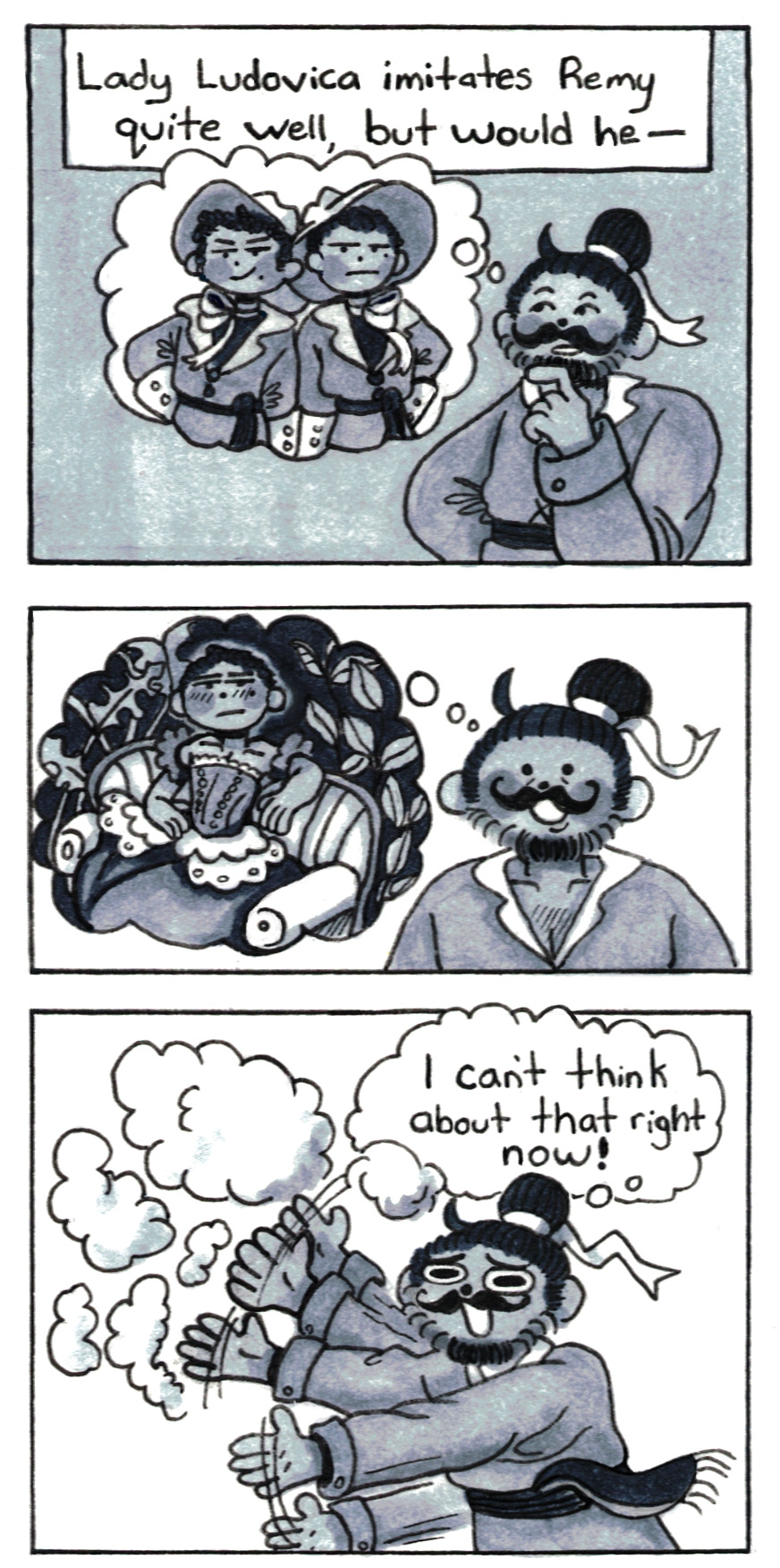
He might be bisexual, but he has a ship to run!
[Commission for June's Ko-Fi raffle winner @primtheamazing! Thank you for the support and for the oppertunity to draw more Tiger Tiger]
#tiger tiger#jamis arlesi#ludovica bonnaire#remy bonnaire#I am once again on my propaganda campaign for Tiger Tiger! And this time I was paid to do it (Not by the author!!!)#There are too many people out there who have yet to be fully convinced by my comics to start reading! So here's more inticement!#Yes I have been re-reading Tiger Tiger again. It is so worth it to look at all the details Petra puts into *all* the dream sequences.#Jamis is great for many reasons *and* his bisexual torment dreams are some of my favourite parts of early Tiger Tiger.#You can't separate Jamis from his sexuality! He might not fully process it but his heart and desires are critical for us to understand him.#Arguably a huge part of Tiger Tiger is about sensuality and working through the mysteries of one's heart.#Love how there is a big abyssal creature of the deep that is a non-binary lesbian - and how queer their following is.#Are we afraid of what we cannot see? Are we afraid of who we are in the dark? In what we see in our dreams? Or is it simply unexplored?#That's my reading at least.#That aside - glad to see I am not the only one who was expecting Remy to have to play the part of his sister after she stole his identity.#It would have been delightful fun but I understand why it did not happen. But I have the power to draw and dream!#And the power to give Jamis even more torment. This man bullies himself even in his thoughts and dreams. Rest in shards mate.
887 notes
·
View notes
Text
Wanting vs Being.
Wanting and being may look similar on the surface, but they operate from completely different realities. When you want something, there is a silent agreement that you don’t already have it. Wanting says, “It’s not mine yet, but I hope it will be.” That statement creates a gap—a space between you and the thing you desire. Even if the words sound empowered, the identity underneath is still one of separation. You’re standing outside the scene, looking in, hoping to be let in. The world hears that frequency and mirrors it back. You’ll see delay, almosts, maybes, or silence. Because wanting never collapses the distance. It defines it.
Being doesn’t operate with gaps. It doesn’t ask. It doesn’t hope. It doesn’t even reach. Being says, “This is who I am. This is already mine.” Not as fantasy—but as identity. And that’s the only thing the outer world can mirror back. When you are the one who already has it, reality begins rearranging to serve that truth. People respond differently. Circumstances shift without force. You don’t notice it happening because you’re not tracking anything. You’re living from the end. And the end never waits.
Wanting keeps you in loops. It leads to effort, doubt, chasing, and disappointment. It tricks you into thinking you’re doing something useful. You feel productive when you want clearly, visualize harder, and affirm constantly. But underneath it all, you’re still broadcasting: “It isn’t here yet.” And as long as that’s your identity, the result stays one step away. You don’t attract what you want. You attract what you are being.
Being ends the loop. It doesn’t need to be loud. It doesn’t need to be perfect. It just needs to be final. The moment you say, “I’m done wanting. I’m being,” and you stop checking for signs, the shift lands. Not because you believed hard enough, but because you stopped narrating as the girl who doesn’t have it. Being is quieter than wanting, but it’s in finitely more powerful. It doesn’t try to prove. It doesn’t try to make anything happen. It simply lives as if it already did.
So the next time you catch yourself wanting—stop. Don’t shame it. Just notice it. And then decide: “I’m no longer the one who wants. I am the one who already is.” Let the silence settle. Let the old voice flicker and fade. You don’t need to fight it. You just don’t feed it. Being is always one refusal away. Refusal to perform the old story. Refusal to act like it’s still far. And when you drop into being, the dream doesn’t just shift. It can’t help it.
♡♡♡
#affirming loa#loassumption#loa tumblr#loablr#loa blog#loassblog#law of assumption#law of manifestation#master manifestor#instant manifestation#manifesation#manifesting#affirmations#affirm and persist#affirmdaily#affirm and manifest 🫧 🎀✨ ִִֶָ ٠˟#persistent#assume and persist#awareness#conciousness#identity shift#shifting#shiftblr#shifting blog#reality shifting#desired reality
331 notes
·
View notes
Text
I've seen quite a few bad thg opinions the past couple days so here's a reminder that these things are canon:
Katniss is suicidal until Peeta comes home. He gives her the hope she needs to heal and move forward. They eventually enter a romantic relationship because she desires and loves him.
Katniss's only reason for not wanting kids was her deep-seated fear that they'd be reaped. Becoming a mother shows how much she's recovered from her trauma. Her children make her feel joy.
Katniss is happy in 12. She would've ended up there anyway. (“A few hundred others return because, whatever has happened, this is our home.”)
So anyone who thinks her ending isn't good or what she wanted probably doesn't actually like Katniss and definitely doesn't understand her character as she's written. Thankfully her creator does know her and gave her the peaceful ending she deserves.
#this fandom is too damn big#too many casuals#and people with questionable reading skills#and people who ignore canon so they can project their own identities/desires onto characters#katniss everdeen#the hunger games
891 notes
·
View notes
Text
realizing that people who equate cynicism with intellectual rigor are often just being lazy and pathetic has been so helpful tbh
#like the endless amount of cynicism i see on here particularly amongst american leftists just very much reads to me#as a combination of moral ocd and identity politics / optics#where if you’re sad/angry enough it excuses you from participating in the real world#instead of like. funneling a real desire to see positive change into channels of action#anyways. aoc and rashida talib the only bitches out here i respect#i am never going to be a person who responds to like. paragraphs about how electoral politics are evil or america is evil like yeah. true.#but i live here. people i love live here. strangers i love live here. so now what do i do that is Real outside of the whining chamber#optimism = stupid / fatalism = intellect is like. LOLOLOL#we all have to chose to believe that we can create a world that is livable#which is not to say i am#at all aligned with the dem#establishment or the liberal agenda but like. i’m not taking myself out of the game bc i believe i can Do Something and it’s my duty to do
223 notes
·
View notes
Text
Finally found my male face claim for any realities I'm a man in 🤭

thanks random man named Micheal that I do not know. Can't wait for the boner experience 😼
#what does thing mean about my gender identity?#dont know dont care#i just want to be a man#and a woman#so who cares#reality shifting#shifting#shifting community#shiftblr#shifting motivation#shifting stories#shifters#shifting blog#shifting consciousness#shifting realities#shifting ideas#shifting antis dni#shifting awareness#shifting dr#shifting is easy#shifting is real#shifting journey#shifting mindset#shifting progress#shifting script#shifting to my dr#shifting to desired reality#shifting update#shifting visualization
115 notes
·
View notes
Text
Beyond Sex: When Desire Becomes a Search for the Lost Self
Do you desire women because you want to be one? What your deepest fantasies reveal about your true identity.

He longs for her curves, her softness, her breath. Her skin beneath his fingers. Her voice like water in a dark room.
He thinks he wants her.
But what if he’s mistaken?
What if the woman he desires is not a destination, but a mirror?
Projection vs. Possession
One controversial concept—autogynephilia—describes a condition in which a person assigned male is aroused by imagining themselves as a woman. While traditionally pathologized, this phenomenon may actually hint at a profound psychological truth: the desire to embody the feminine is not a kink, but a symptom of fragmentation.
The erotic charge stems from forbidden identification. The imagined self as woman becomes both sexual object and lost origin. This isn't perversion—it's homesickness.
The Lie of Pursuit
For generations, the masculine drive has been described as a directional force: a forward-thrusting vector toward possession. Philosophy, pop psychology, and even evolutionary biology have echoed the same refrain—men chase, women receive. Men conquer, women yield.
But this narrative begins to unravel when we stop asking how he desires, and start asking why. Not in the evolutionary sense—dopamine, procreation, gene propagation—but in the sense of longing. Ontological hunger. Ache.
What if his attraction to the feminine is not rooted in lack, but in disavowal?
Not a yearning for an "other", but for an exiled aspect of the self.
Desire as Reflection
Many men claim to love femininity—its beauty, its mystery, its gentleness. But beneath that admiration lies something more complex. The feminine is not just admired. It is craved. Think of Narcissus—not as a man in love with his own reflection, but as someone unable to recognize that what he sees is himself feminized. In many modern reinterpretations, the object of his desire appears more delicate, androgynous, beautiful. What if Narcissus doesn't drown because he loves himself, but because he cannot reclaim the feminine part he has been taught to exile?
In contemporary media, we often see this displaced yearning: hypermasculine protagonists obsessed with mysterious women who are less characters than embodiments of intuition, grace, or inner peace. What they chase is not a person—it’s integration. Not just for touch, but for embodiment. For proximity so close it threatens dissolution.
He doesn’t only want to be with her. He wants to be her.
In psychoanalytic settings, therapists have documented a strange and rarely discussed phenomenon: men expressing not just attraction to women, but a painful envy of their perceived emotional freedom, aesthetic self-expression, even menstrual cycles. These aren't merely erotic fascinations—they’re expressions of psychic displacement, a kind of embodied mourning.
One patient, describing his obsession with female dancers, confessed: "It's not that I want to sleep with them. I want to move like them, to be seen like them, to feel like they do.” His arousal masked an unbearable longing for lost identification.
That’s the secret most desire stories won’t tell you.
Because that secret disrupts the whole performance.
The performance of control, of manhood, of linear identity.
The Softness He Forgets He Was
Biologically speaking, the human body begins in fluidity. Embryonic development follows a feminized blueprint by default. Around the sixth week of gestation, all human embryos possess the same undifferentiated structures—structures that will become either testes or ovaries. Without a precise, timed surge of androgens (primarily testosterone), the body continues along its default developmental path: female. In fact, if this hormonal message fails to arrive or is blocked, even XY chromosomes result in a body that appears entirely female.
The "male body", then, is not a natural given—it is a hormonally induced divergence. A constructed detour, not a biological destiny. The so-called "male form" is not a norm, but a mutation—an interruption of flow. A detour, marked by hormonal sculpting and a cultural narrative that fossilizes difference.
But under the skin, the memory remains.
The body remembers what it was before it was made into something else.
Before it was told to harden.
Before it was taught to want, instead of to be.
The Dream of Becoming
We often think of desire as directional: subject seeks object. But desire is also a field of projection. When he sees her delicacy, her openness, her intuitive grace—he is not just observing. He is seeing through a fogged mirror.
She becomes the host for everything he has been forced to bury.
The capacity to surrender.
The ease of vulnerability.
The language of intuition.
Studies using fMRI have shown that, on average, brains assigned female at birth exhibit more activity in regions associated with empathy and affective attunement. But these neurological patterns aren’t fixed—they can be shaped by socialization, trauma, and hormonal influence.
The tragedy is that masculine-coded subjects are systematically cut off from this neuro-emotional potential. The architecture remains. The wiring still exists. But the circuits are never lit. So the longing returns—through fantasy.
None of these traits are exclusive to her—but they are forbidden in him.
So they become eroticized.
Not as something to integrate, but something to consume. To conquer. To hold down. To fuck.
But the real desire isn’t conquest.
It’s return.
A Dangerous Question
So here’s the question no one dares ask:
Do you desire women because you want to be one?
Not in a surface-level, categorical sense. But in the deep, mythic sense. The psychic one. The place where identities blur, and longing reveals the shape of the soul.
The next time you find yourself pulled toward her—aching, jealous, breathless—ask yourself:
Are you reaching for her body?
Or are you reaching for your own?
A Closing Whisper
Desire is not always hunger for the other.
Sometimes, it is mourning for the self.
And what masquerades as lust...
...may be the earliest cry of a forgotten girl, trapped in a performance she never chose.
And maybe the ultimate taboo is not being feminine.
But remembering you always were.
#philosophy#genderfluid#androfemineism#female#femininity#feminism#gender and power#gender identity#gender studies#gender ideology#sexuality#depth psychology#psychology#transfeminism#transformation#transgender#male beauty#desire and identity#identity
2 notes
·
View notes
Text
heart's desire power ending is great because it's like what if you got torturous mindbreaking surgery every month and then it was immediately followed by inverse therapy slowly and steadily grooming you into Something You Are Not, shaping the fundamental aspects of your personality and identity before you even realize they're being altered, destroying your instincts until you forget if, or even why you ever wanted to protest this in the first place, and you did all of that while being at the mercy of an utterly poisonous group of ""people"" who decimate your mental health just by existing in your presence. and you threw away your chance at freedom and adoration and escape and happiness just for this. you chose this, deliberately, purposefully. you brought this upon yourself. you have no choice but to outlive everything you love and watch the person you were fade into a distant memory and you don't even have the dignity to scream and cry and fight against it anymore. it doesn't even cross your mind. you chose this, just you, entirely of your own volition, and now you have to live with it. You Have To Live With It.
and also what if you were an AWESOME TRANSGENDER FURRY 🔥🔥🔥🦇🏳️⚧️🔥🔥🔥
#yin-thoughts#fallen london#incredibly shocking post to see from The Scoundrel Guy. who couldve possibly predicted this ik#ive never once mentioned mr cards ever in my life#fallen london spoilers#heart's desire spoilers#identity horror#identity death#ask to tag#<- adding that because i know the nitty-gritty of the power ending and what it entails can be. uh.#A Lot.
115 notes
·
View notes
Text
How to Drop the Ego (Without a Fight)
The ego isn’t a villain. It’s just an outdated narrator. It’s the voice of the version of you who still believes in lack, effort, fear, and separation. Ego is the one who thinks she has to fix her life. She believes she’s just a "person" in a world full of obstacles. But you are not her. You are the awareness in which she appears.
You don’t drop the ego by arguing with it. You don’t fix it. You don’t silence it. You simply stop being the one who listens. That’s the real shift. When a thought rises that says, “You’re not good enough,” you don’t debate it. You just recognize: “That voice isn’t me anymore.” You don’t even need to replace it. You just refuse to perform as the self who believes it’s true.
Ego can’t survive without your attention. It can’t project anything new unless you agree to be the character it’s narrating. So when you stop playing along, when you stop reacting, defending, fixing, it loses power. Not because you destroyed it, but because you’re no longer feeding it.
To drop the ego means to stop identifying as the one who lacks. It means you stop chasing wholeness and start moving from the truth that you already are. That you were never broken. That nothing is missing. It’s not about reaching a high state. It’s about no longer letting a small version of self speak for you. You don’t need to become enlightened. You just need to refuse to narrate from the old story.
The moment you say, “I’m not her anymore,” and stop acting like her, ego falls away on its own. The dream shifts. The delay ends. Not because you cleared all your thoughts, but because you stopped thinking they mattered. And what’s left isn’t silence—it’s clarity. The knowing that doesn’t argue. The awareness that doesn’t flinch. That’s who you are. And that’s all you ever needed to be.
♡♡♡
#loa tumblr#loassumption#shiftblr#shifting blog#loa blog#loablr#reality shifting#law of manifestation#desired reality#law of assumption#identity shift#instant identity shift#identity#ego#awareness
194 notes
·
View notes
Text
Laios, Monsters, & Toshiro: On Racialized Desire and Identification with the Other
Arguably, the most significant part of Laios' character is the societal ostracization he faces because of his non-normative interests and behavior. For the majority of his life, Laios struggles socially, and other humans mistreat him. When he rescues Marcille from the Nightmares, his nightmare dredges up his inability to fit into school and the army. During his early dungeoneering days, he's lied to and exploited by his fellow party members.

One of his earliest and most formative negative experiences with people is his village's abuse of Falin as a magic user. He shares that after the villagers discovered that she can use magic, "adults who were just kind yesterday, all began to bully [her]." Instead of protecting Falin, his parent tell her to leave the village. The prejudice Falin faces and his parents' response to it upsets Laios to the point that he leaves home.

While Laios cares about his friends, the Demon points out that Laios understandably does not care for people in general. Laios doesn't disagree with the Demon's assessment and suspects that the Demon "can sense all [his] thoughts." The Demon goes on to say that Laios actually "despise[s] all humans." Laios denies this assessment, but given the Demon's uncanny ability to sniff out people's desires and Laios' ashamed expression, at least part of Laios likely agrees with the Demon. It's not a stretch to assume that he's held onto some hurt and resentment towards humans due to their mistreatment of him and Falin in their youth.

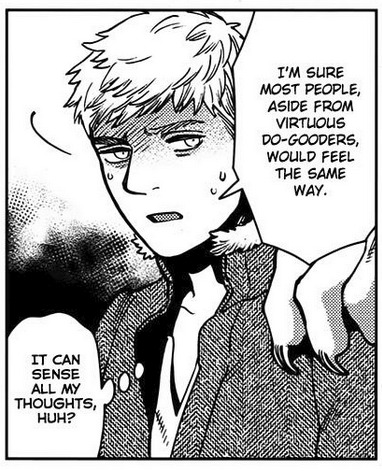
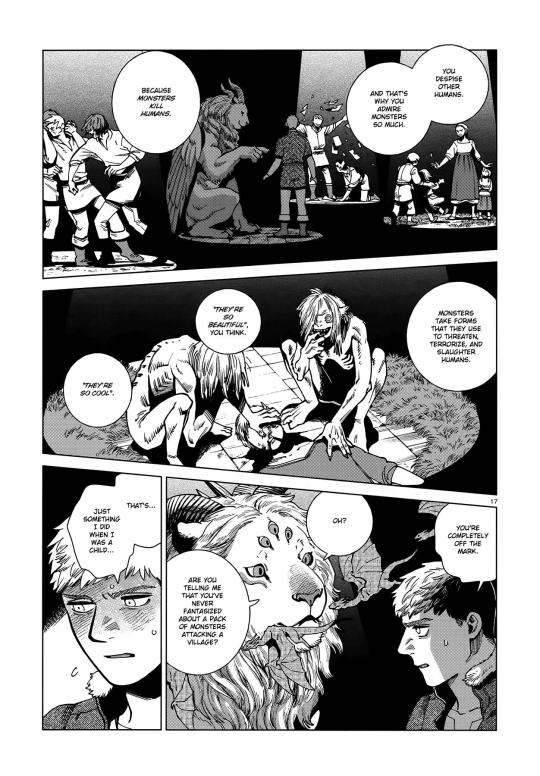
In response to how human society has othered him, Laios distances himself from humans and invests his time and energy into monsters and demi-humans instead. In the DunMeshi world, monsters and demi-humans are the ultimate societal Other. People fear them, exploit them, and even hunt and kill them. As someone who's similarly been mistreated by human society, Laios resonates deeply with monsters.
His desire to become a monster and/or beastman reflects his desire to reclaim agency over how society has ostracized him. If he chooses to become a monster, he gets to place value on what society has deemed despicable. He gets to choose why society hates him and be different on his own terms.
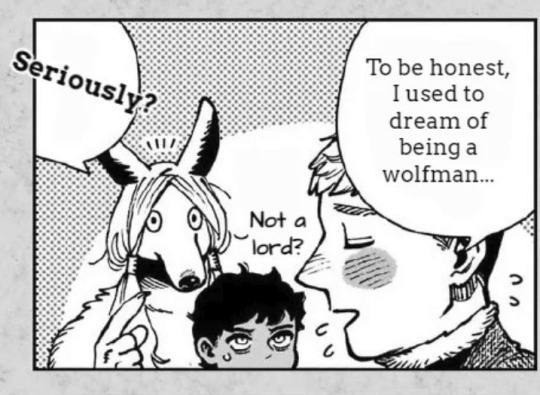
Both textually and thematically, Laios' identification with the Other bleeds into the erotic. More blatantly, he says that he'd have sex with orc women, and his succubus is a monstrous version of Marcille.


The entire story is also steeped in the theme of consumption as carnality. Laios and his party spend the entire manga eating monsters — a taboo physical act which they reap pleasure from; the underlying eroticism isn't difficult to see.
The story also presents consumption as a form of extreme identification. Eating a monster makes the monster part of you through digestion. The line between consuming the monster and becoming the monster — between erotic desire for the monster, demonstrated by eating their flesh, and identifying with the monster — is very blurred. Note that digesting a monster is an act of absorption; it destroys the original creature. Senshi states that consuming a monster erases "its individual identity," and major manga spoilers, but Laios defeats and pacifies the Demon by consuming its desire to eat. We'll come back to this concept later.
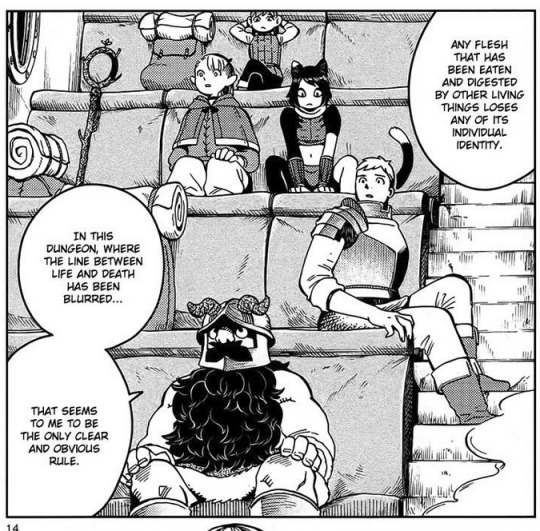
As previously mentioned, Laios is disinterested in most humans. The notable exception to this rule is Toshiro and by extension, the Eastern Archipelago. Laios doesn't seem to know much about the Archipelago before speaking to Toshiro, so he isn't drawn to Toshiro because he's an Easterner. Instead, he's drawn to his "odd appearance."
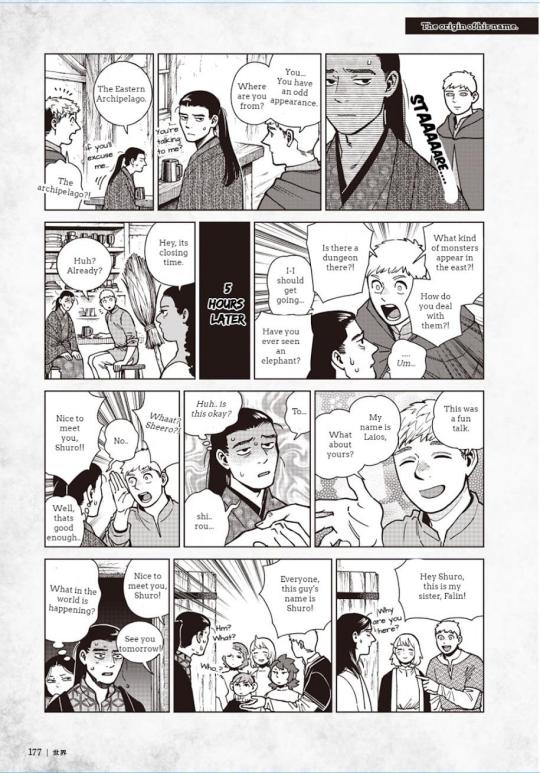
Just like Laios views monsters and demi-humans as a visible Other, Laios views Toshiro as another visible Other. On the Island, Toshiro stands out as a foreigner at first glance. While Laios as a white tallman doesn't appear visibly strange to other people, he's drawn again and again to people and creatures who are immediately visibly "odd." He sees them as understanding what it's like to be different and be mistreated for it, and since he relates to that experience, he wants to learn about them and be closer to them.
Essentially, Laios behaves towards Toshiro and his culture the same way he behaves towards monsters; he wants to know everything about Toshiro's foreign culture — the thing which makes him different. Unintentionally, Laios unintentionally reduces Toshiro to being Japanese; if he wasn't Japanese, Laios would never have approached him.
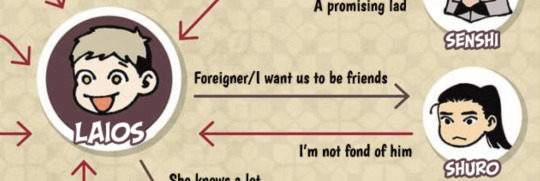
While Laios doesn't have bad intentions, as Toshiro himself acknowledges during their fight, his behavior towards Toshiro still has negative consequences. Laios' harmless interest in monsters translates to fetishization in the context of Japanese culture. He enacts multiple microaggressions against Toshiro and crossing his boundaries.
Laios goes beyond merely learning about Japanese culture. He takes parts of it for himself when he names his sword a Japanese name. Akin to his consumption of monsters, Laios attempts to participate in Toshiro's culture while failing to respect Toshiro himself. Just as eating monsters destroys them, Laios consuming Toshiro's culture while enacting racism against him causes real harm.
Many people have already written about Laios' microaggressions towards Toshiro, but a couple include Laios telling Toshiro that he looks "odd" and asking where he's from, mispronouncing his name as "Shuro," and assuming his favorite food is rice. Laios' treatment and fetishization of Toshiro is racist and harmful. However, I'd like to dive beyond the surface of Laios' micro-aggressive remarks and examine how his obsession with Toshiro becomes a racialized mode of desire, paralleling real world phenomena.
Though no concrete canonical evidence of Laios' feelings towards Toshiro being romantic and/or sexual exists, his interactions with Toshiro have erotic undertones. Their fight dialogue, in particular, revolves around eating, an act the story consistently shows as carnal. During this fight, Laios places his thumb in Toshiro's mouth and asks him, "What's the point of even having a mouth?" Laios' penetration of Toshiro's body via his mouth and his question's potential as an innuendo lend themselves to an erotic reading of the scene's more obvious conflict. Considering the overlap between consumption and carnality throughout the story, it's not a large jump to read eroticism into Laios demanding Toshiro meet his body's physical needs.

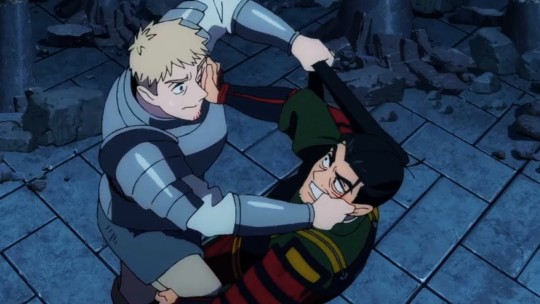
Furthermore, Laios is more enthusiastic about Toshiro than any other human in the series. While he cares deeply about his sister and his friends, Laios repeatedly expresses how much he admires Toshiro. He retains and brings up things like Toshiro's (perceived) favorite food. He wants to go to the East in Falin's place after she rejects Toshiro's marriage proposal, and in the "What-If" extra material, he's adamant about setting up a scenario where Toshiro travels with him through the Dungeon.

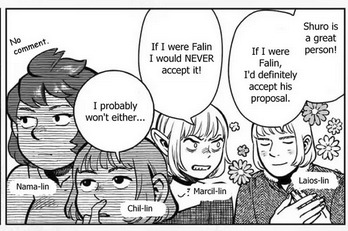

Undoubtedly, Laios is drawn to Toshiro. Since he sees non-white-ness and monstrosity as equivalent markers of societal othering, Toshiro's identity as a foreigner is what cultivates and maintains Laios' interest in him. Even if Laios learns to care for Toshiro as a person, his desire for Toshiro, platonically or otherwise, is still filtered heavily through race within the narrative.
Laios' relationship with his masculinity is also fraught. He broke off his engagement with a girl from his village and doesn't express normative interest in female tallmen. Seeing how the nightmare versions of his parents ask him when he's going to give them grandchildren, Laios experiences societal pressure to conform to a normative performance of masculinity through being attracted to and marrying a tallman woman and creating a family with her.
Laios frequently talks about how cool and admirable Toshiro is when he performs masculinity through combat, etc. He might find Toshiro's Asian masculinity more appealing and more accessible to him than the masculinity that's been forced onto him, precisely because Toshiro's Asian masculinity appears non-normative in a Western lens. But co-opting the masculinities of men of color as a white man would only further feed into the white consumption of cultures of color.
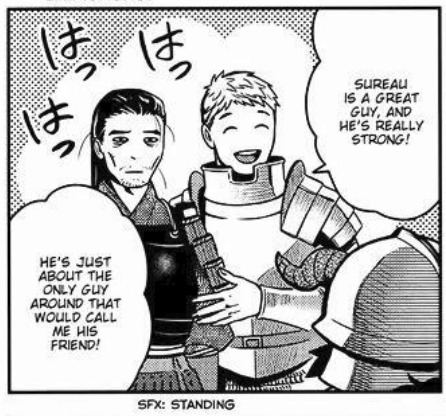
Overall, Laios' entitlement to and consumption of Toshiro's culture mirrors the real-life way white people co-opt and fetishize non-white cultures. Laios' fetishistic treatment of Japanese culture, because of his attraction (platonic or otherwise) to Toshiro, parallels white people's treatment of Asian people in the Western diaspora. I can only speak on the Asian American experience, but Laios immediately being drawn to Toshiro's "odd appearance," obsessing over his culture, and primarily treating Toshiro as a conduit for his said culture feels eerily close to how some white anime and/or K-pop fans act towards Japanese and Korean people.
Similarly to Laios, real queer, neurodivergent, and/or otherwise non-normative white people are marginalized by white Western society. They relate to how society others non-white cultures and/or people of color and latch onto them. While forming human connections based on curiosity and shared experiences is wonderful, white people are often unaware of the racial dynamics at play when they engage with non-white cultures and people of color and unintentionally, end up consuming and fetishizing non-white cultures in detrimental ways.
None of this negates the reality that Laios and Toshiro canonically care for each other. For instance, Toshiro's willingness to hug Laios reveals his genuine familiarity with and affection for him. The racial dynamics of their friendship complicate their relationship in fascinating ways and open up a potential path for Laios' growth. With time and effort, Laios could absolutely unlearn his racism and become a much better friend to Toshiro.
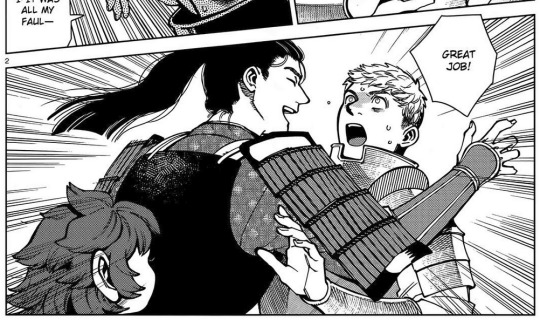
In conclusion, Laios' behavior towards Toshiro is a study in a marginalized white person's identification with and racialized desire for a non-white Other and how even a well-intentioned attempt at connection can replicate harmful racist dynamics. Toshiro's experience with Laios closely parallels real Asian people's struggles with racism and fetishization in our world today.
#laios touden#toshiro nakamoto#shuro#dungeon meshi#dunmeshi meta#dunmeshi analysis#i didn't want this to be superrr long but laios' treatment of the orcs is similar to his treatment of toshiro#he takes their cultural practices out of context and appropriates them (i.e. him wearing spoils of war when he declares himself king)#frankly him wanting to be an orc/wanting to sleep w orc women/appropriating their culture#and blurring the lines between identification/desire/consumption is even more clear than w toshiro#ryoko kui has a lot of interesting racial commentary in her work#but also she kinda flops on her depictions of black and brown ppl#anyw all very interesting to examine#i love u themes of consumption and desire and identity and borderline cannibalism#dunmeshi#delicious in dungeon#*mine#*meta
359 notes
·
View notes
Text
been thinking about how similar vic's s2 hair looks to how their hair looks at the end of the s1 finale (obviously styled neater).



not a huge change, obviously, because vic has a pretty different idea of a huge change than most. at least outwardly. but it got me thinking more about how vic's seemingly miniscule appearance changes are indicative of (gestures vaguely in their direction).
with s1 vic we get someone who's at least able to add a bit of vibrancy and personality via a.. muted pink shirt... which obviously isnt very vibrant but again this is vic. as for the hairstyle, it seems a bit... cutesier than s2? if you get what i mean? like i get a much younger vibe from s1 vic as opposed to s2 vic.
s1 finale vic is obviously pretty fucked up from The Augburt, but as we can tell from all of s2, it hasnt caused any fundamental personality changes in the right direction. she dug her foot into the dirt, stayed grounded in their ways, but the effect augburt had on them didnt go away. they also kept a more similarish hairstyle to the one they woke up with after seeing augbert. which probably means nothing
we got some insight into the s2 costume change in the last looks ep for zeke
s2 vic has bouncier hair and a bigger broach! what fun additions! but also their shirt is a shade of nude and her suit is also the same shade of nude as before. so her whole appearance is essentially becoming dedicated to being the host of this show! and thus becoming more monotone in the process and not acknowledging who they are outside of work! awesome!
its like candice said:

it feels like theyre trying to fade into the background. of the set. of the set for the show that they host. theyre trying to fade into the background. of the set. for the show they host.
speaking of the set, can you guess what HAS gotten slightly more vibrant? can you guess? can you guess? its the fucking set of course its the set


again, not by much, but same deal as before. bluer rug, gold plated leaves, more unique furniture, fish......? and a lot of swans. emblematic of their transformation, one might say.
i dont have a way to end this section so im just gonna leave with this


so what's next?
we're nearing the end of s2 with s3 hopefully on the way, and a potential outfit change to go with it. as of when this post was written, we have an imminent divorce and a potential loss of some funding for the show (see: this post). there are a couple directions that both her outfit and her character could head in depending on how those conflicts present themselves.
direction 1: leaning into their ways as they suggested in candice's episode; treating the crew even worse, burying themselves further into work, identifying even further with the host persona and losing themself in the process. not entirely sure how this will translate costume wise, but it will obviously be blander or "more serious". i dont think this loss of the self will be/ is accidental at all, and it seems like this process of making vic = vip is in fact very intentional. i dont have the words to explain vic repression but you can read the beloved @bantersnatch kinda touch on it here in their post about vianca.
option 2: BRAND NEW identity crisis of [insert severity] resulting in an attempted self rebrand via outfit change of [insert severity]. idk how confident i am in this direction since a big change in appearance isnt very talk-show-host-like, but then again neither is a divorce induced identity crisis stacked on top of the preexisting ones.
secret third thing: idk. tell me
#desire mona#vic identity crisis is not a new concept and im not really bringing anything New to the table#just pointing out more evidence of what we already know#very very excited for the finale im so glad lisa gilroy is back bc her s1 ep is triggering for me#two birds - typoon#(user bantersnatch i am listening to your vianca playlist get me out of here im falling down a hole)#dropout#dropout tv#very important people#vip#vic michaelis#host!vic
98 notes
·
View notes
Text
hal should become a real boy and also a rabbit (prototyped with the piece of the bunny in lil seb) and also a sylph of mind send tweet
#hal strider#hes pretty obviously set up for an arc where his happiness is becoming discrete from dirk and also Real and Alive#this also brings a better resolution to the bunny story than 'one of them explodes in the sun and the other just drops out of the story'#last we see it is with caliborn during his Masterpiece so i ask you where did the bunny go???#but also the alpha kids are involved in alice in wonderland symbolism#jane = alice | dirk = queen of hearts | jake = mad hatter | roxy = cheshire cat#hal is the white rabbit and directly associated with rabbits via lil seb#also his main difference to dirk is his supercomputer processing which he uses most prominently to predict outcomes (MIND!)#when he's begging for his life he invokes logic morality and ethics (MIND!)#and he clearly struggles with his own identity and desires (MIND!)#and between him and dirk hal is actually the master manipulator (MIND!)#dirk is needy and actually pretty straightforward in his 'manipulations' hes just solipsistic (HEART!)#and hal insisting over and over hes doing things for dirk's sake and dirk's own good is so enable-y and fussy (SYLPH!)#and he would be the hard counter to the condy's mind control which vriska shouldn't be able to do#(since if aranea could take care of jane/jade by putting them to sleep she would - but she didn't#and she's stronger than vriska in psionics)#also the meowrails should break up (its own essay) and nepeta <> hal and equius <> dirk#sorry to meowrails fans pls dont send death threats im doing this for their own good#So Yeah
123 notes
·
View notes
Text


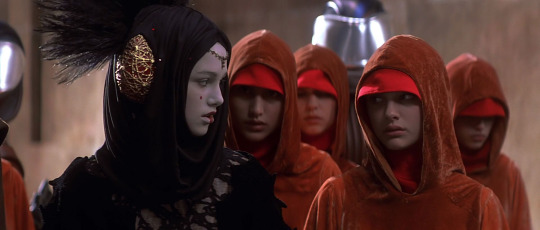


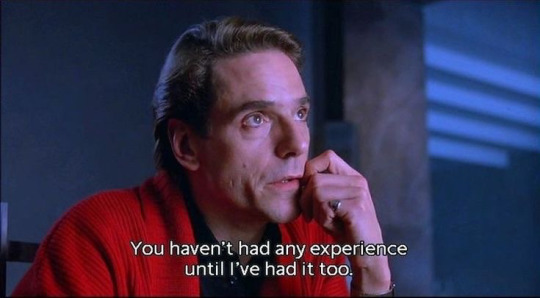


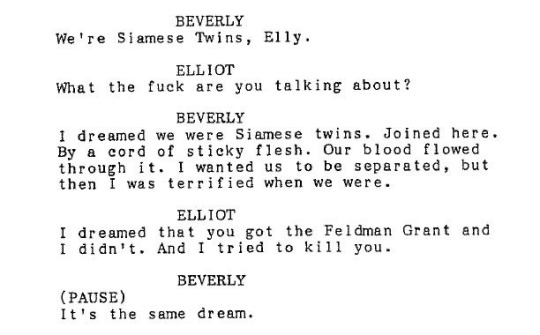

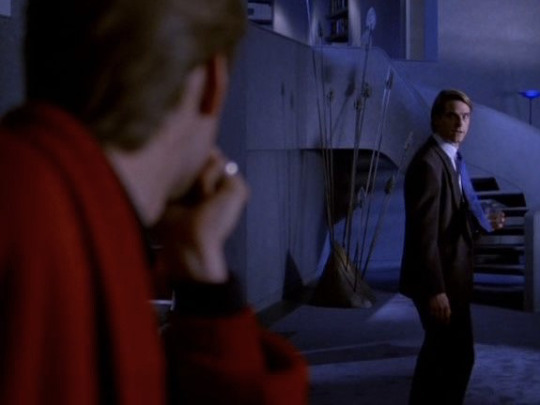
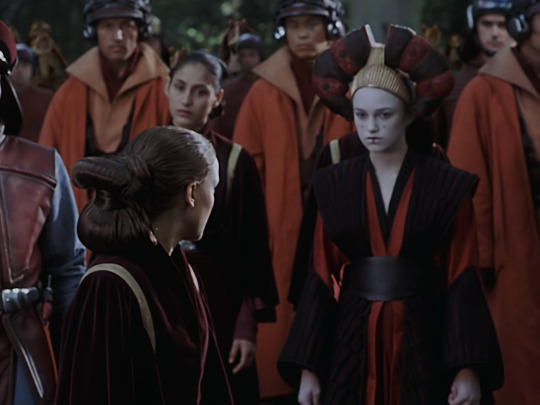
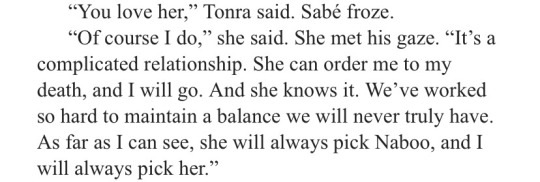
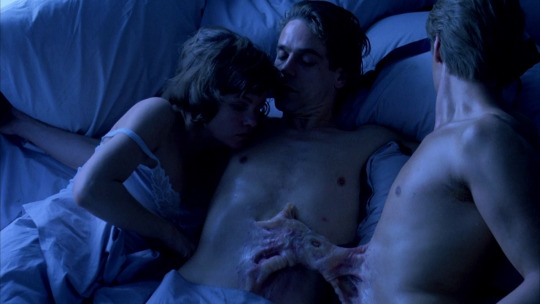
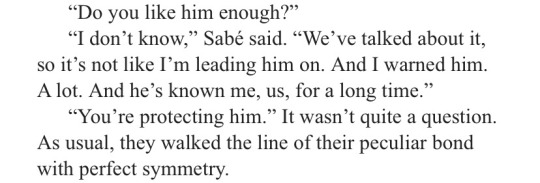
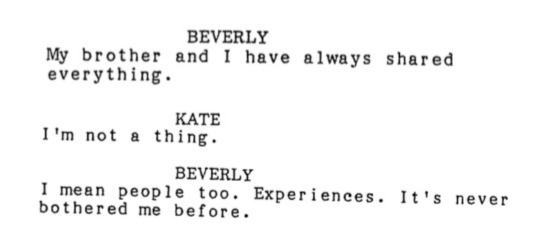






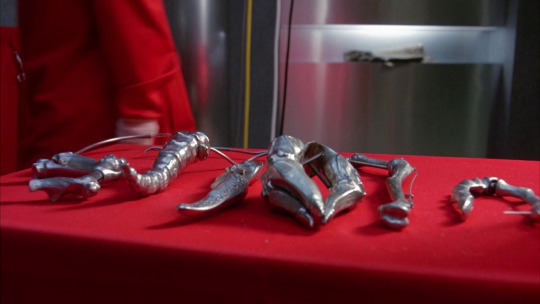
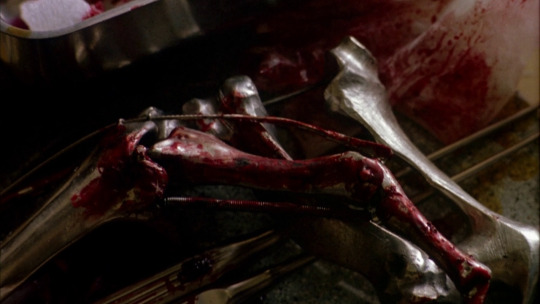

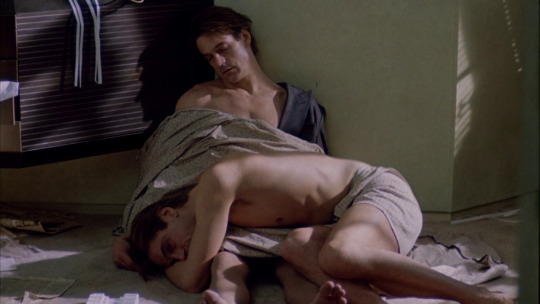
SEPARATION CAN BE A TERRIFYING THING.
sabédala + dead ringers
queen’s peril by ek johnston / cronenberg on cronenberg by david cronenberg and chris rodley / the phantom menace (1999) dir. george lucas / dead ringers (1988) dir. david cronenberg / queen’s shadow by ek johnston / dead ringers screenplay by norman snider and david cronenberg / queen’s hope by ek johnston
#possibly one of the more insane things i’ve put out into the world#do you get it tho#it's about their closeness crossing lines in a way that feels wrong. it's about the identity erosion and codependency#it is NOT me saying their dynamic is sisterly/familial in the traditional sense#it’s not. not in a way that cancels out romantic desire at least#this is too weird and niche for anyone to care at all#web weaving#sabé#tsabin#padmé amidala#padme amidala#sabedala#sabédala#star wars#star wars prequels#the phantom menace#dead ringers#david cronenberg#webweaving#web weave#if u saw this earlier no u didn’t
209 notes
·
View notes
Text

The latest episode of Desire the series hasn't changed my mind about Gao Tu. He remains a very interesting character.

I believe he is the victim of trauma induced by his parents. On one side, we have his mother who was an omega and thus faced a lot of hardships, at the end of her husband. She was a victim of abuse and associated it with the fact she was an omega. Her fear of letting anyone else live her terrible life was transmitted to her son. She insisted so much on him hiding his true nature and pretending to be a beta that it lead him to keep this false identity for so many years. Her stress response to anything related of the fact they are both omega had an impact on her parenting.



She forced him to hide who he is from a very early age. Her high stress has created unhealthy behavior answers from her son. His secretive nature, reserved behavior and his way of dealing with hurtful events stemmed indirectly from the interactions and relationship with his mother. He also seems to have developed anxiety, guilt and a form of depression that are signs you can have when you're dealing with traumatic events.


On the other hand, there is his father who has a gambling problem. Children of parents who gamble can experience financial difficulties. We know his father never kept any money and that's why his family was pretty poor. Nowadays, Gao Tu is the only person in the family with financial resources. In the past, his father used to ask money from his wife and when she didn't have enough he would even suggest her to sell her body because she is an omega. It could have further the trauma response of being an omega. Gao Tu probably heard this since he was young so being an omega could have been associated in his mind with being poor, abused and not worth it.

Now, his father seeks money from him when he needs it. This is still emotionally damaging. Children of gamblers can have low self-esteem and can even feel worthless. We know that Gao Tu doesn't have a high opinion of himself because of being an omega, but it can also be explained by the gambling addiction of his father. His father is quick to anger and has some mood swings when things don't go his way. It's a lot of stress for someone who is as emotionally vulnerable as Gao Tu is. There is another issue in Gao Tu's family related to his sister. She may be an alpha, but she has been sick for a long time and her health problem cost a lot of money. Since Gao Tu is the sole bread earner on the family, he is the only who is paying for her treatment and yet he still has to deal with his father's addiction. This must take a tool on his well-being.


Let's not forget that Gao Tu isn't just experiencing bad mental well-being, but to hide his omega scent, he also takes a combination of medication that is affection his physical health too. Omegas carry the heat and in the absence of a partner and self-medication, Gao Tu is experiencing such a stress response that could endanger his life. All of this is probably also affecting is mental well-being. It's a vicious circle!

In short, Gao Tu must act like the guardian of his sister, the bank for his father and carry his mother's fear of being an omega. It's a miracle he is still a (barely) functioning person.


His life would have been maybe easier, if he also didn't fall in love with his friend/boss Shen Wenlang. Now, he also carries a huge guilt about the fact that he is lying to him too. In the first episode, Gao Tu explains that Shen Wenlang when he was young didn't interact with a lot of omega and that's why he isn't their biggest fan (which is an understatement).


Shen Wenlang has said several time that he hates omegas and hates their scent. Gao Tu has been hiding his own omega scent for so long and hearing this is only furthering him into thinking he is worthless. In fact, Gao Tu should probably follow his doctor's advice of seeking a psychiatrist. He has always been taught unhealthy behavioral responses, which makes him not functioning properly and thus live in a vicious circle that feeds from his parents induced traumas.

It's really hard to watch him being stuck in this and I can't wait to see him escape it. I hope he will learn to stop his bad habits that stemmed from his stressful and traumatic past. I bet if one person truly accepts him for whom he is and not what he pretends to be, it will already be a big step on the right path. If this acceptance comes from Shen Wenlang this will be huge. However, is Shen Wenlang's aversion for omegas only coming from his past, or is it something that also comes from jealousy of Gao Tu's fake partner that he invented to explain why he had to take a leave when he was experiencing the heat? I can't wait to get the answer to these questions.
#bl series#bl drama#thai series#thai bl#my thoughts#desire the series#episode 4#ch: Gao Tu#ch: Shen Wenlang#shen wenlang x gao tu#a/b/o desire#he is truly the most fascinated character for me#Is hiding his true identity as an omega could be a metaphor of the experience queer people can have when they are in the closet?#I took so many screenshots for this article and ended up choosing so little
49 notes
·
View notes
Text
its important that u all understand that if "some girls have facial hair" is normal and good, then "some girls want to have facial hair" is also normal and good. wanting to have facial hair/a deep voice/big muscles/a flat chest isn't always indicative of being a man. im cistrans, im a girl, i wanna look like hasan piker. i still dont wanna be perceived as male, i still dont wanna be referred to as he/him, i just wanna be a girl that looks like hasan piker. that doesnt change the fact that im a girl
#if your appearence is not indicative of your gender identity#then your desired appearence is also not indicative of your gender identity#trans#cistrans
862 notes
·
View notes